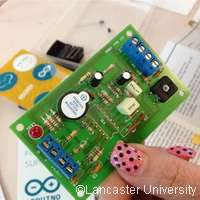How innovation helps homeless people

Lancaster University researchers and homeless people have succeeded in developing a prototype that could help the latter take better care of themselves. It is often a challenge for homeless people to make and keep appointments. The 'Personal Appointment Ticketing' (Pat) service allows them to keep track of their appointments, whether they are related to health or social work issues. A specially made wristband or plastic card contains all the important information they need to stay updated. Once swiped, the wristband or card provides a printout of the dates, times and places of their appointments. Pat is based on simple, inexpensive technology, including the credit-card-sized computer Raspberry PI.
Caseworkers and service users from the Signposts charity, which supports Lancashire and Cumbria-based homeless groups, are currently testing the service. It will be launched on 28 November at the Midland Hotel, Morecambe in the United Kingdom. Individuals will have the chance to find out about the project in greater detail and see the prototype in action.
The prototype is an outcome of the Patchworks research project, which brought together the Lancaster University group with Signposts and MadLab, a Manchester-based team of do-it-yourself scientists, artists and designers who share and experiment with inexpensive, open-source technology.
'Unlike other projects of this kind, Patchworks depends on the imaginations, experiences, design and manufacturing skills of homeless communities themselves,' said project leader Dr Rod Dillon of Lancaster University. 'We are not telling people what we can do for them; we are asking what they need and working with them to create it. We hope this tool will help people make more appointments because they have access to a different type of reminder system, and lead to improvement in quality of life.'
Dr Dillon added that participating in the prototype development process enabled all those involved in Signposts to gain a better understanding of technologies and the way they function.
'Indirectly, through taking part in the Patchworks prototype development process, Signposts staff and clients have increased awareness of technologies and how they work,' he said. 'They have also made new connections which we hope will continue, enabling them to make improvements in their lives and the services they provide and receive.'
Commenting on this latest development, Signposts Project Director, Sharon Calverley, said: 'Patchworks is a really exciting initiative - there is amazing potential for the technical side of this project to make a real difference to homeless people. What makes it really brilliant is the idea of two groups from very different backgrounds working together for the benefit of a marginalised section of the local community.'
More information: www.catalystproject.org.uk/content/patchworks
















